E-commerce platform. Part 3. What is the secret of the popularity of Magento?
Hello, Habr!
In our past articles, we began to introduce you to the largest and most popular e-commerce platforms. Now it’s the turn of Magento. Yet this is one of the most popular e-commerce platforms. So much has been written and said about this platform that we can only try to explain the reasons for such popularity of Magento, as well as highlight the main nuances of working with this platform.
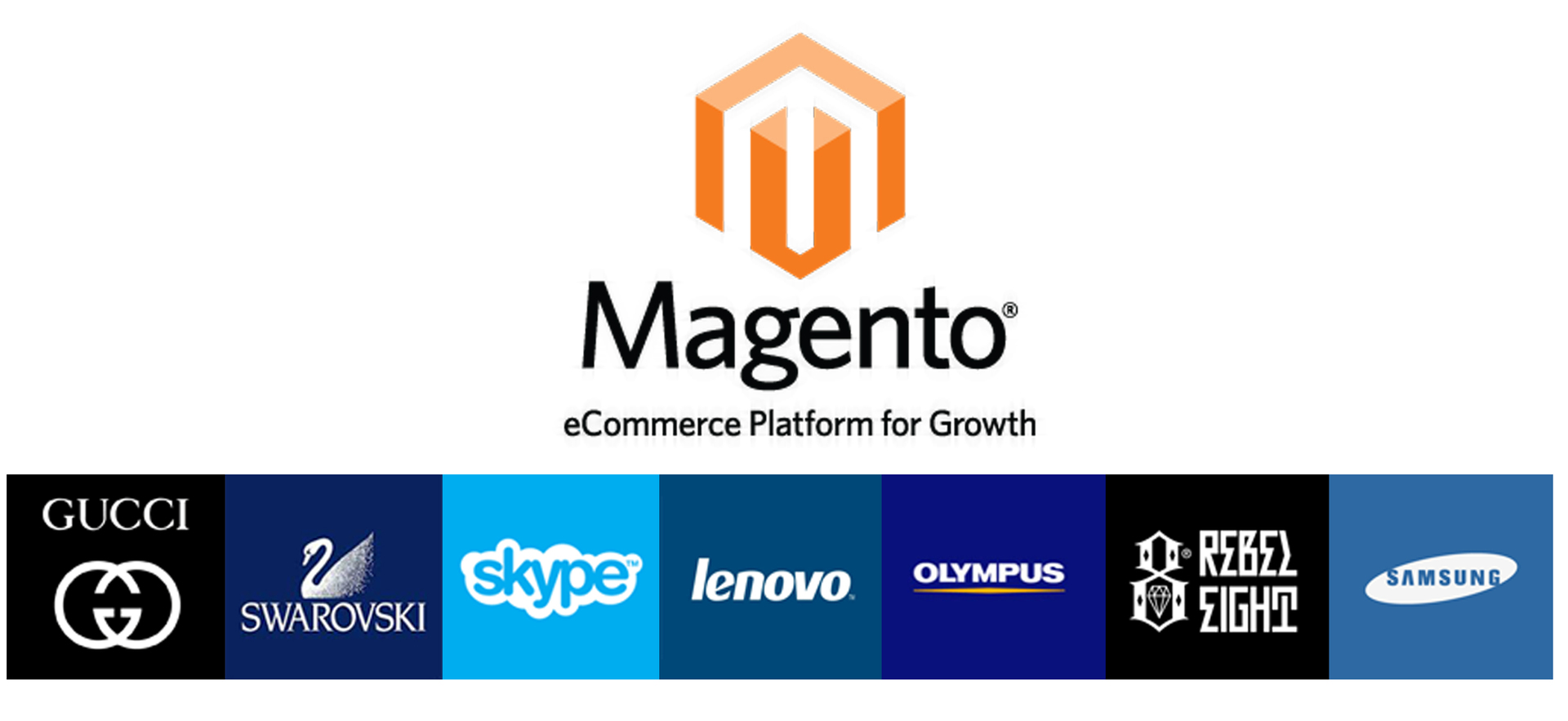
Well, let's start the acquaintance. First, a little history. Magento is being developed by Varien, whose previous project was OsCommerce. Work on Magento started in early 2007, and after 7 months, in August, a beta version of the platform was released. The main developers were the Americans Roy Rubin and Yoav Kutner. In 2010, eBay Inc. bought 49% stake in Magento for $ 22.5 million, and in 2011 Magento completely became the property of eBay Inc.
Our next step in exploring Magento will be to review the brands that have entrusted their online store to this platform. These are such bison of commerce as: Lenovo, Samsung, Gucci, Rebel8, Olympus, Skype, Swarovski and many others. You must admit that the names of brands are impressive, and such companies cannot fall into the dirt by launching an online store that does not meet all their requirements and expectations of customers. Yes, and if you look at the statistics of the website alexa.com, then we will see that Magento is the most popular e-commerce platform. Among the million most popular online stores, most are written in Magento. Such popularity of the platform is explained by its diverse and fairly wide capabilities, but let's not forget who the owner is, which gives an additional impetus to the success of Magento.

Fig. Popularity chart of e-commerce platforms for April 2014
Magento is an open source platform written in PHP. You can use both the free version of the platform and paid: Enterprise version with advanced functionality and support for your online store, or Magento Go, working in the “cloud”. If you have a choice between Community and Enterprise versions, then first you need to determine what goals you set for your online market. If your shop will attract no more than 1000 unique users per month, and the average monthly number of sales will be close to 100, then the functionality of the Community version should be enough. The Enterprise version, in turn, has the following advantages over Community: the ability to organize gift certificates and cards; the possibility of customer segmentation, as well as the organization of closed sales of goods for certain groups of customers; functionality is included for wholesalers and distributors; Magento Enterprise has the opportunity to reward regular customers by crediting them with bonus points for purchases in your online store. As you can see, there are enough differences, but whether you need additional paid functionality is up to you.
And so, let's move on to the advantages of this platform. One of Magento's main strengths is its modular architecture. In practice, this means that you have a platform core around which modules are already being added as the functionality needs to be expanded. You can find these extensions in Magento Connect, where there are both paid and free extensions for the online store. We also note the fact that for the community version, the number of quality extensions, even free ones, is going through the roof in the market. Entering the Magento Connect website, we see that we have a very large selection of different extensions, for which we can sort them by popularity, platform, Community, Enterprise, Magento Go, which will be put on “extension”, as well as price: free and paid.
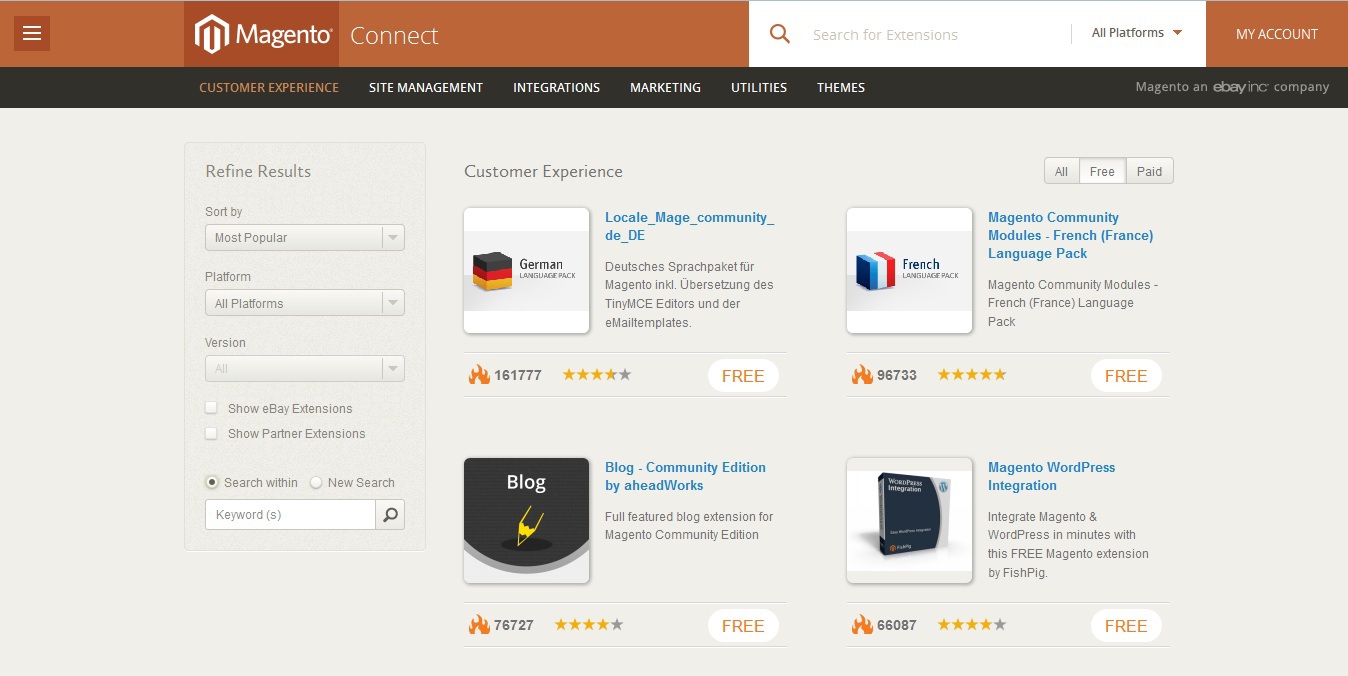
Fig. Magento connect
Also a significant plus when choosing Magento is responsive web design, supported by the platform that comes in the boxed edition. That is, the design of the site on Magento will be conveniently viewed on devices with different resolutions and formats, without requiring the creation of separate types of sites for various devices, whether smartphones, tablets or netbooks.


Fig. Mobile and standard version of the site swarovski.com
The next distinctive advantage of the Magento platform is the ability to create and then manage several online stores from a single entry point, which eliminates the need to work with multiple admin panels at the same time. Another important advantage of the platform is the ability to assign the product specific characteristics necessary only for this type of product, work with several currencies and, if necessary, convert them quickly.
Now let's get acquainted with the appearance of the admin panel by performing some tasks.
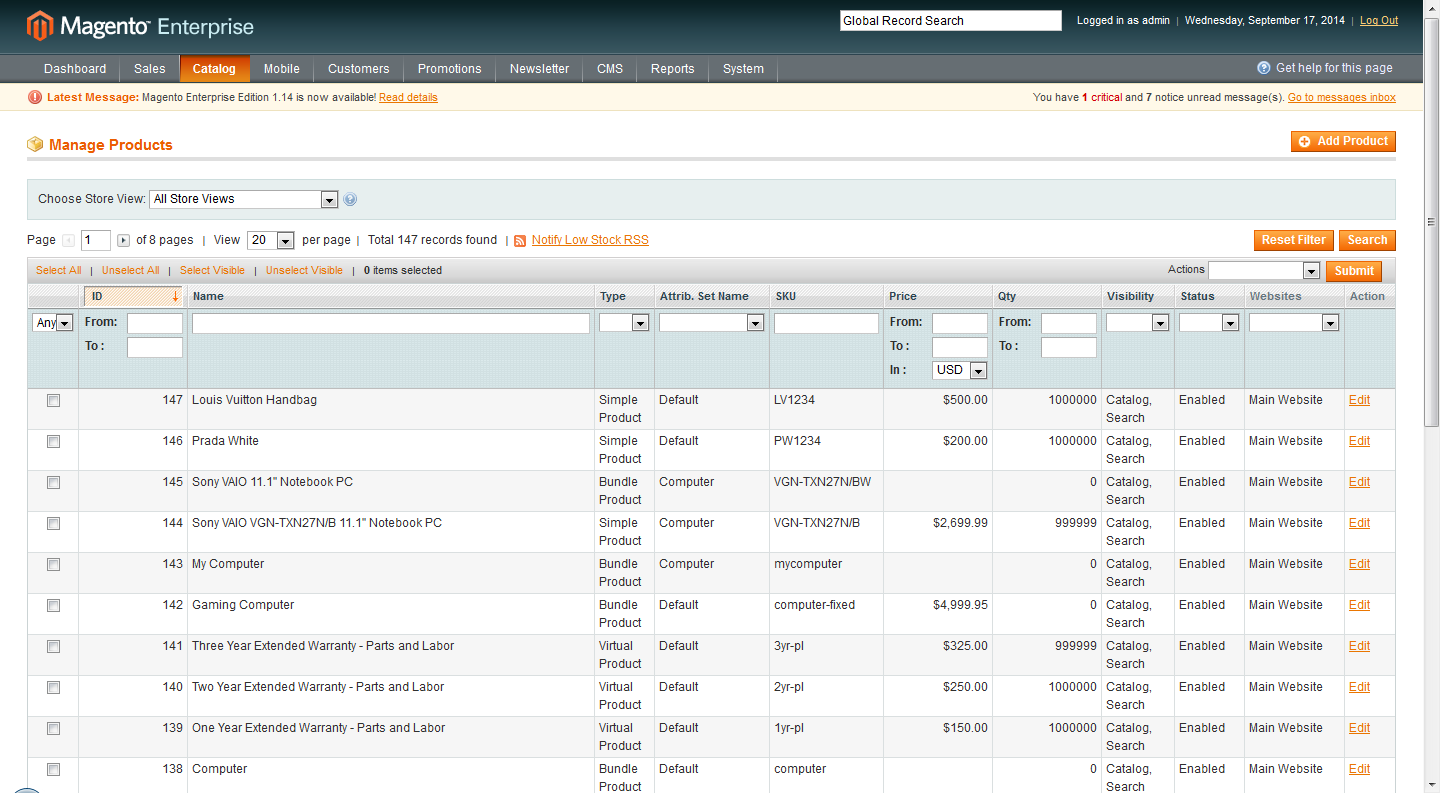
Fig. Managing the list of products
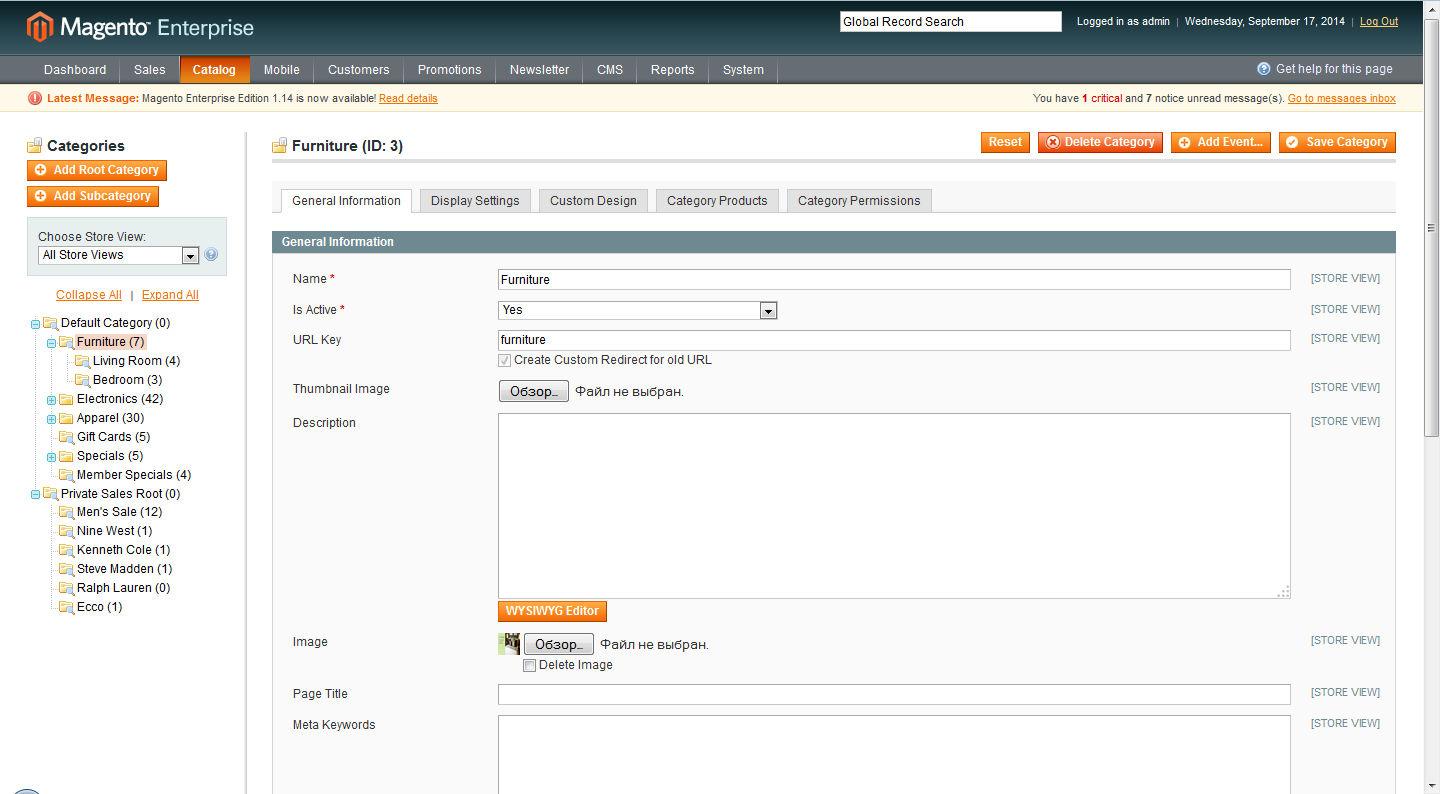
Fig. Editing categories of product groups through the admin interface
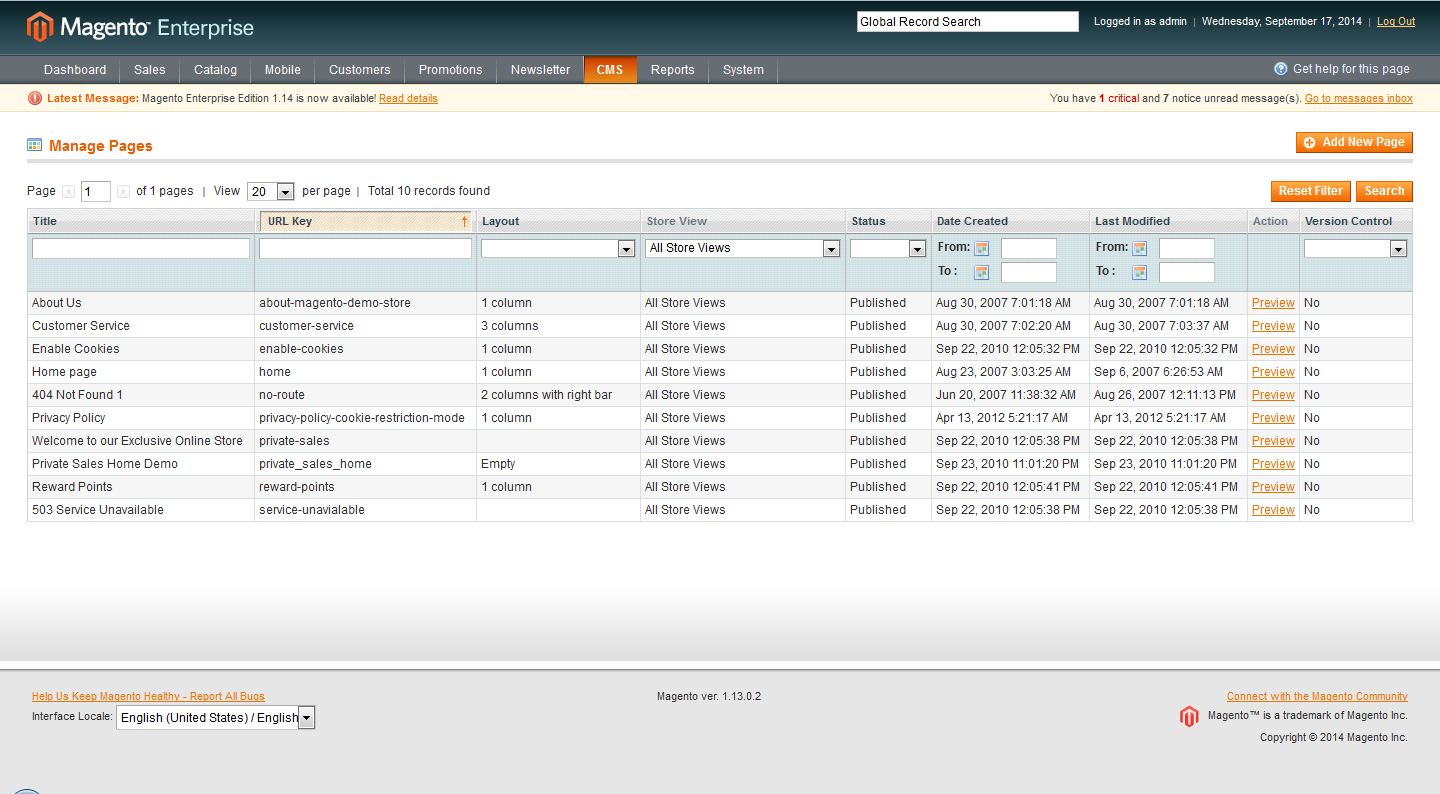
Fig. Editing Stats Pages
Let's move on to the disadvantages of this platform. The first thing that comes to mind is the exactingness of resources, because for a good production site you need a good server and high-quality hosting. The next drawback of developing an online site on this platform is the cost of developer services if you need to implement custom functionality. Well, the open PHP code carries some problems, because by ignorance you can harm your store by rummaging where you do not need to.
Well, it's time for conclusions. Magento is a good solution for your online store, as proven by many well-known brands. Wide functionality, intuitive interface, the ability to decide for yourself what extensions you need, the ability to integrate with third-party services, and all this is available to you even in the free Community version - these are the reasons to make a choice. Magento. We also note that in the Western countries the Magento platform is used by representatives of both small and medium-sized businesses. In the CIS countries, the situation is radically different, because not every representative of a small business can afford to maintain an online store on Magento, therefore in these countries the platform is mainly used by medium-sized businesses.
In our past articles, we began to introduce you to the largest and most popular e-commerce platforms. Now it’s the turn of Magento. Yet this is one of the most popular e-commerce platforms. So much has been written and said about this platform that we can only try to explain the reasons for such popularity of Magento, as well as highlight the main nuances of working with this platform.

Well, let's start the acquaintance. First, a little history. Magento is being developed by Varien, whose previous project was OsCommerce. Work on Magento started in early 2007, and after 7 months, in August, a beta version of the platform was released. The main developers were the Americans Roy Rubin and Yoav Kutner. In 2010, eBay Inc. bought 49% stake in Magento for $ 22.5 million, and in 2011 Magento completely became the property of eBay Inc.
Our next step in exploring Magento will be to review the brands that have entrusted their online store to this platform. These are such bison of commerce as: Lenovo, Samsung, Gucci, Rebel8, Olympus, Skype, Swarovski and many others. You must admit that the names of brands are impressive, and such companies cannot fall into the dirt by launching an online store that does not meet all their requirements and expectations of customers. Yes, and if you look at the statistics of the website alexa.com, then we will see that Magento is the most popular e-commerce platform. Among the million most popular online stores, most are written in Magento. Such popularity of the platform is explained by its diverse and fairly wide capabilities, but let's not forget who the owner is, which gives an additional impetus to the success of Magento.

Fig. Popularity chart of e-commerce platforms for April 2014
Magento is an open source platform written in PHP. You can use both the free version of the platform and paid: Enterprise version with advanced functionality and support for your online store, or Magento Go, working in the “cloud”. If you have a choice between Community and Enterprise versions, then first you need to determine what goals you set for your online market. If your shop will attract no more than 1000 unique users per month, and the average monthly number of sales will be close to 100, then the functionality of the Community version should be enough. The Enterprise version, in turn, has the following advantages over Community: the ability to organize gift certificates and cards; the possibility of customer segmentation, as well as the organization of closed sales of goods for certain groups of customers; functionality is included for wholesalers and distributors; Magento Enterprise has the opportunity to reward regular customers by crediting them with bonus points for purchases in your online store. As you can see, there are enough differences, but whether you need additional paid functionality is up to you.
And so, let's move on to the advantages of this platform. One of Magento's main strengths is its modular architecture. In practice, this means that you have a platform core around which modules are already being added as the functionality needs to be expanded. You can find these extensions in Magento Connect, where there are both paid and free extensions for the online store. We also note the fact that for the community version, the number of quality extensions, even free ones, is going through the roof in the market. Entering the Magento Connect website, we see that we have a very large selection of different extensions, for which we can sort them by popularity, platform, Community, Enterprise, Magento Go, which will be put on “extension”, as well as price: free and paid.

Fig. Magento connect
Also a significant plus when choosing Magento is responsive web design, supported by the platform that comes in the boxed edition. That is, the design of the site on Magento will be conveniently viewed on devices with different resolutions and formats, without requiring the creation of separate types of sites for various devices, whether smartphones, tablets or netbooks.


Fig. Mobile and standard version of the site swarovski.com
The next distinctive advantage of the Magento platform is the ability to create and then manage several online stores from a single entry point, which eliminates the need to work with multiple admin panels at the same time. Another important advantage of the platform is the ability to assign the product specific characteristics necessary only for this type of product, work with several currencies and, if necessary, convert them quickly.
Now let's get acquainted with the appearance of the admin panel by performing some tasks.

Fig. Managing the list of products

Fig. Editing categories of product groups through the admin interface

Fig. Editing Stats Pages
Let's move on to the disadvantages of this platform. The first thing that comes to mind is the exactingness of resources, because for a good production site you need a good server and high-quality hosting. The next drawback of developing an online site on this platform is the cost of developer services if you need to implement custom functionality. Well, the open PHP code carries some problems, because by ignorance you can harm your store by rummaging where you do not need to.
Well, it's time for conclusions. Magento is a good solution for your online store, as proven by many well-known brands. Wide functionality, intuitive interface, the ability to decide for yourself what extensions you need, the ability to integrate with third-party services, and all this is available to you even in the free Community version - these are the reasons to make a choice. Magento. We also note that in the Western countries the Magento platform is used by representatives of both small and medium-sized businesses. In the CIS countries, the situation is radically different, because not every representative of a small business can afford to maintain an online store on Magento, therefore in these countries the platform is mainly used by medium-sized businesses.
